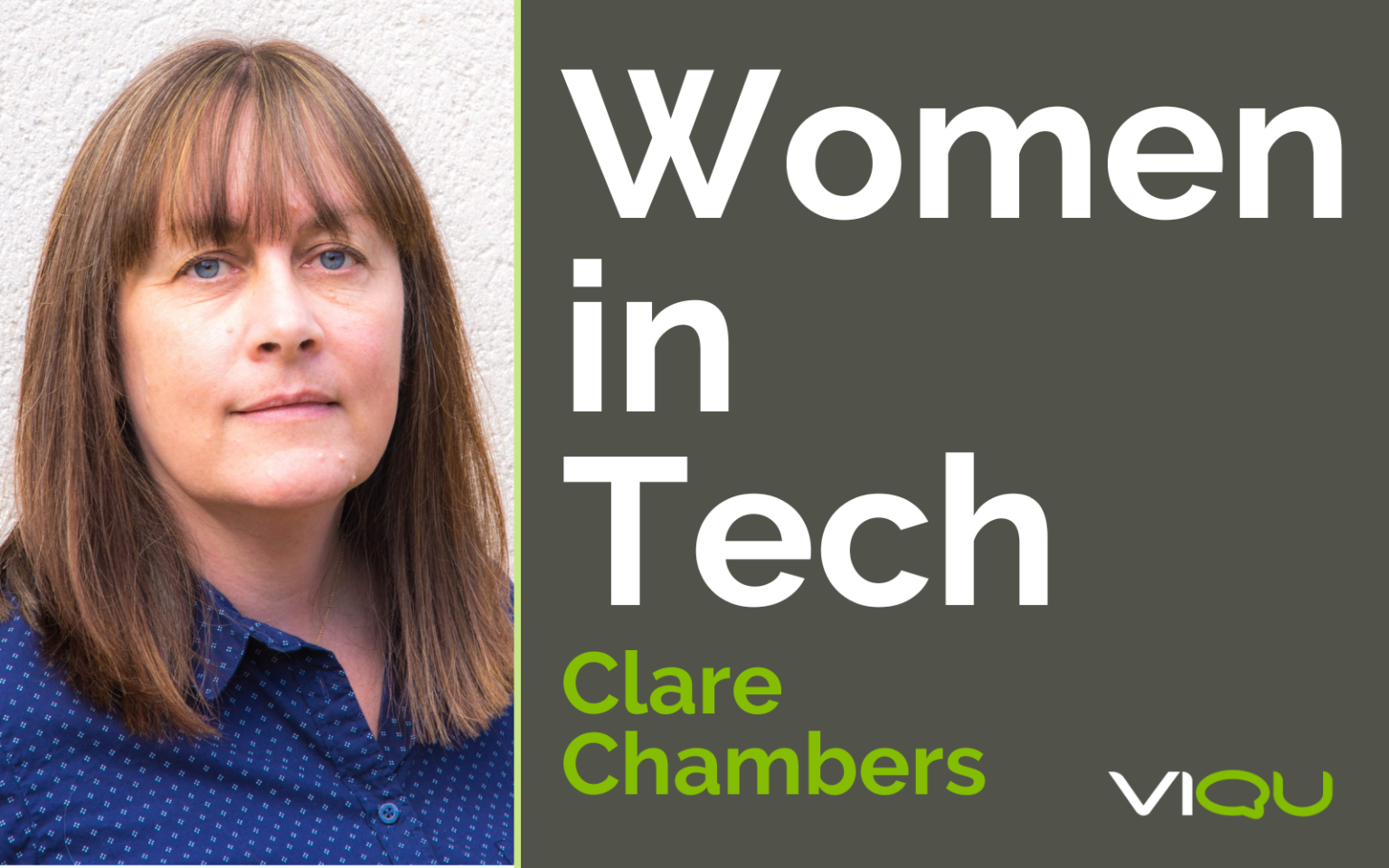Women In Tech: Interview With Chief Digital Officer, Clare Chambers

Almost 40% of women working in tech in Europe, the Middle East and Africa are considering switching roles in the next year. Additionally, more than one-third of these individuals are looking to move roles because they are seeking more equitable career opportunities, according to Skillsoft.
My latest interview in my ‘Women in Tech’ series is with Clare Chambers, Chief Digital Officer for Northamptonshire Police and Northamptonshire Fire and Rescue Services. Clare discusses how her career in IT came about by chance, why she’s chosen to continue working in the public sector for 25+ years, and how her gender has positively and negatively impacted her career.
What is your role at Northamptonshire Police and Northamptonshire Fire and Rescue Services?
In Northamptonshire, we have a pretty unique arrangement in that the Fire Service used to be part of the County Council. When the County Council went bust a few years ago, the Fire Service needed a new home. The Police Commissioner decided to take on the Fire Service, becoming the joint Police, Fire and Crime Commissioner. He saw many benefits in being a joint commissioner, in that he could create a back office set of functions that operated across both organisations. It’s better use of taxpayer money and creates a lot of efficiencies.
My role is a new role for the organisation as I look after both the Police and Fire Service. I’ve been with the organisation for just over 2 years now. I’ve got the snappy title of ‘Chief Digital Officer for Northamptonshire Police and Northamptonshire Fire and Rescue Services’ (CDO).
What are your core responsibilities?
I look after the digital, data and technology (DDaT) function in what we call ‘Enabling Services’. It’s made up of traditional back office functions like HR, finance, procurement etc.
Previously, there was a smaller IT department in the Fire Service, and a larger department in the Police. We had a big investment to enable the team to come together to service the Police and Fire Service. In fact, I was told it was the biggest investment in history in Northamptonshire non-frontline services. Since that point, we’ve also taken on the change function, performance and data, and information assurance for both organisations. So it’s a big team!
With your role being so diverse I assume your days differ greatly, but could you describe what a typical day is like for you?
It’s very varied. That’s one of the things I really like about my role. It is more strategic than day-to-day work. Occasionally I get pulled into day-to-day things, which I actually quite enjoy because that’s what I used to do all those years ago.
My day tends to start around 8am. I pretty much have back-to-back calls and a small break in the middle for lunch. Due to them having separate governance structures, I might have strategic calls with the Police or the Fire Service. I also have departmental calls with individuals and teams who directly report to me. Sometimes I’m pulled in to discuss personnel matters. I’m also SRO for several large projects, and then there are general calls associated with me being an SLT member of Enabling Services. There are also calls where we as ‘Enabling Services’ come together to discuss what we’re doing on behalf of both organisations. So it’s really varied. No day is the same.
Why did you decide to study Decision Science at university, and how did that translate into a career in tech?
IT was never a career consideration for me. And it certainly wasn’t something that was talked about when I was at school or university. My degree was in the dark ages, when there wasn’t such a thing as a career in IT. Forgive me for the generalisation, but back then, IT was a dark room, with middle-aged white guys in sandals, surrounded by big tape machines.
So when I left school, I had no idea what to do. I wasn’t particularly academic, but my father said I should go to university. One of the things I had always been pretty good at was maths, so I chose to study Decision Science. It was basically an operational research, maths-based, decision-making sort of degree. It was all about probability and statistics. So absolutely nothing to do with IT. In fact, I didn’t even type up my dissertation, as we didn’t have access to computers. We gave it to the lady in the library to type up!
How did you find yourself pursuing a career in tech?
The kind of career I should’ve gone into based on my degree was actuary studies, insurance, information analysis type roles. At the time when I left university, the job market wasn’t good. I wasn’t sure what I wanted to do, so I went temping. I did everything from picking fruit on farms to washing up.
One role I really enjoyed was working on the reception desk at a distribution and warehousing company. It was rare for the time, but this company had an IT Director because there were lots of functions around import/export that did use computers. Just by chance, someone said they needed to go for a coffee break, and asked me to cover for them. I went into their department, and someone said they were having a problem with the new system. They asked if I knew anything about computers. I didn’t, but I said I’d have a look. Somehow, I sorted the problem. This got back to the IT Director, who then asked me if I wanted a job in the IT department. I asked if it was permanent. It was. So I agreed. That’s how my career in IT began!
So you really just fell into IT by chance?
Absolutely, I went through the back door! I’ve never been one of those people who has a plan. I’ve always just fallen into things. I often have people say to me that they are concerned because they don’t have a career plan, and I always reply with my own career as the example. It’s okay not to have a plan!
I call it the ‘Sliding Door’ effect. That chance thing that happens can change the course of your life and career. I could’ve ended up in insurance, but instead, I work in IT!
How did you progress your career from that initial opportunity?
So that role was with a private company. I was there for a couple of years, and then I saw a job advertised at the local hospital in IT. It was way out of my skill level, but my father told me to apply anyway. It was closer to home and almost double what I was earning.
I got an interview. In those days, you got an interview if you were a woman because you ticked a box. So it worked in my favour. Unsurprisingly given the leap in salary, I didn’t get the job. But they rang me up and said they had something else I would be more suitable for. It was a service desk role – answering the phone, first line fixes etc. and that’s how I got into the public sector.
What has your career journey in the public sector been like?
In total, I spent 23 years in the NHS before I moved into my current role. I worked my way up from service desk to PC support. I remember walking the corridors of the hospital with a pager, waiting for it to ring to tell me where the problem was. From there I went into servers. It was the very early days of the Microsoft Exchange. In fact, I supported the first Exchange server in the whole hospital.
After 10 years, I moved into management with various NHS organisations, and then I moved into the role I am in today.
Why have you always chosen to stay working in the public sector?
It’s been an unconscious conscious choice. Each time I looked to change roles, I always ended up taking a job in the public sector. It’s only been recently that I realised why.
A few years ago, I did a Masters degree in Leadership. One of the first things I learnt was that you have to know and understand yourself before you can lead others. We did an exercise around values and how important it is that the values you have match the organisation you work for.
It might sound cheesy, but one of my values is the importance of giving back to society. It’s different now, but when I was younger there weren’t as many private organisations that cared about giving back. It was all about profit. So I didn’t realise it at the time, but I now understand that I’ve always chosen to remain in the public sector because it matches my values.
What is it about technology that excites you?
I think it’s seeing the benefits technology can have on organisations and the public. It wasn’t always like that. At times, it was like pushing water up a hill, trying to prove that technological advancements could make someone’s life easier and better. Luckily, things have moved at such a pace, that that’s become more and more obvious to everyone.
Do you think there is an adequate representation of women in the tech industry?
Not yet. For most of my career, probably up until 10 years ago, I was normally the only woman in the IT department, certainly the only woman in a technical role. Women would often be on the service desk answering the phone, but to have a female in a technical role and/or a female managing members of staff was very unusual.
There have been all sorts of changes over time to make it easier and better for women to get into IT roles. Although I’ve got some horror stories from working with all-male teams. But I think the situation has improved to make tech more attractive for women.
We haven’t got nearly as many women as I’d like, but when I look at my team, we do have multiple women working in technical roles. We have a good ratio of men to women working in project management and business analysis, but I’m really keen to encourage women into technical roles too.
I imagine the Police and Fire Service, even outside of technology, is quite male-dominated, what’s your experience been and how has that impacted you?
I’m quite desensitised to it now in terms of noticing if I’m the only woman in a room. I don’t tend to notice anymore, but I do see it when I attend technical conferences and the ladies loos never has a queue. I went to a more general conference recently and was genuinely surprised when I walked into the loo to find a queue. I’m just not used to being surrounded by other women at these kinds of events!
Police and Fire Service leadership teams do tend to be dominated by white middle-aged men. It’s unusual to see Chiefs and Chief Officers that are women. It’s disappointing when a big deal is made of a woman getting one of these roles. It shouldn’t have to be the case, but it is.
Do you think positive action has a place in businesses and organisations?
It certainly has a place, but not in terms of a business only being willing to interview and hire a woman. That’s going too far. Positive action should be about working out where your gaps are, whether that’s women, ethnic minority groups, or even men. The second step is to understand how to encourage people to apply to fill that gap. This might be through mentorship, application support etc. It shouldn’t just be a case of giving them the job.
Is there anything you have done personally to encourage more women to explore tech careers?
I’m really passionate about mentoring women who are trying to get on in technology and create a career for themselves. Sometimes women have challenges with confidence, or practical things like needing flexible working. I really enjoy having those conversations.
I’ve spoken at a number of conferences about the lack of women in tech. I certainly don’t take the ‘burn your bra’ stance. It’s about creating awareness that the lack of women in tech careers is as much a male problem as it is a female problem.
Have you had occasions in your career where you have felt discriminated against because of your gender?
Not so much recently, but when I worked in the private sector a long time ago, I think there was a mindset of ‘she’s a woman, she won’t know what she’s doing’. I remember being sent away by an individual demanding ‘a proper engineer’.
Within teams, I’ve had it where men have made assumptions about what I need and how I like to operate, without asking me.
Do you think your gender has helped you in any way in your career in tech?
My gender has created issues, but it’s also helped me on a number of occasions, especially in leadership roles. Being an authentic leader and being female gives me different qualities to a male leader. I think it has helped me build trust and be a nurturing leader. Especially in the Police and Fire Service, where it’s a different style that people aren’t used to.
If you could pick one moment from your career that you are really proud of, what would it be?
One of the things that stands out was being involved in a recruitment where I was sitting on the panel as a lay representative. It was mostly male applicants, and I could see that many of them were moulding themselves on the white male leaders in the organisation at that time.
There was one woman who came forward. She was clearly an introvert and remarkably different to the others being interviewed. Due to the fact she was a woman and an introvert, she stood out. I’m also an introvert and I could recognise it in her. So I explained to the panel what it means. I think I talked the panel into giving her an opportunity. I don’t think she would’ve got through the interview if I hadn’t done that.
It’s only one person, so it’s not a big deal. But I’m quite proud of that. I helped and enabled someone to get on in their career.
Wow Clare – that’s incredibly modest of you. The fact you changed the mindset of those individuals could mean that your one action has a huge impact on multiple people in future recruitment panels…
I think it’s really interesting when you’re talking with someone and you have a connection because they’re like you. You can recognise yourself in them. What’s really good about my organisation is that they’re very open to diversity in leadership and in understanding that you need different mindsets to represent communities and at leadership level.
Who would you say your hero is?
I’m going to be cheeky and say two. From a work perspective, it has to be my very first IT Director. Without that person, I wouldn’t have started the career I have now.
From a personal perspective, I could say numerous people, but the standout has to be my husband. He took over from my dad with the ‘give it a go, of course you can do it’ encouragement that I needed from behind the scenes.
My character is quite introverted. I’m not particularly confident. So I need someone behind me pushing and encouraging. I wouldn’t have got to where I am today without him.
What advice would you give to a young woman hoping to pursue a career in technology?
Make contacts. I suggest getting a mentor who you can relate to. Find someone who doesn’t have any skin in the game, someone who isn’t related to you, and who simply wants to help. A mentor is great for bouncing ideas off and giving you a boost of confidence when you need it. Technical learning is one thing, but on a personal level, having a mentor-type person who is happy to guide you and give you a safe space to express how you are feeling, is critical.
I’d also recommend attending exhibitions, conferences, round table discussions etc. anything where you can have random conversations and make contacts with people who are related to your field.
Thank you for checking out our latest interview in our Women in Tech series – you can access more interviews from the series here.
Please click here to get in touch if you are looking for talented individuals to join your tech team!
Similar articles you might like...

VIQU Appointed As G-Cloud 14 Supplier
We are excited to announce that VIQU will continue to offer first-class cloud support services to our public sector clients through our appointment as a supplier on the G-Cloud 14 framework.

In The Age Of Artificial Intelligence, Why Are Businesses Prioritising Female Decision-Makers?
It has been found that employing women in AI teams and leadership positions is strategically important for tech businesses as AI grows in popularity.
Latest jobs
Full Stack Developer
 Glenrothes, United Kingdom
Glenrothes, United Kingdom
 £40k - 50k per year + Bonus
£40k - 50k per year + Bonus
Full Stack DeveloperSalary: £40,000 - £50,000 per annum plus bonusGlenrothes, Scotland (Full time on site)VIQU have partnered with a leading organisation who are looking to recruit a full stack developer join their development team. The...
Site Supervisor
 Stone, United Kingdom
Stone, United Kingdom
 Market related
Market related
Job Title: Site Supervisor Location: Stone (on-site)- must have full UK Driving License. Salary: market- relatedVIQU has partnered with a top engineering company seeking a Site Supervisor to create and manage project plans. The...
Site Manager - Nuclear Division
 Staffordshire, United Kingdom
Staffordshire, United Kingdom
 Competitive Salary
Competitive Salary
Site Manager - Nuclear Division - Competitive SalaryLocation: StaffordshireVIQU have partnered with a company that has been leading the charge in advanced system integration for decades. The Role:We're looking for an experienced Site Manager with strong...
Telephony Engineer
 Cardiff, United Kingdom
Cardiff, United Kingdom
 £35k - 45k per year
£35k - 45k per year
Telephony Engineer - 12 Month FTC – £35- £45,000 Location: Cardiff (Minimum 3 days on-site) Company: VIQU - Partnered with a Public Sector OrganisationVIQU is working with a Public Sector client to find an experienced...
Solution Architect
 London, United Kingdom
London, United Kingdom
 £650 - 750 per day + Inside IR35
£650 - 750 per day + Inside IR35
Solution Architect – Workplace Modernisation – 12 months ContractA Global Firm are at the start of a Workplace Modernisation programme of work and require a Solutions Architect to join the team and help design this...


